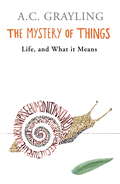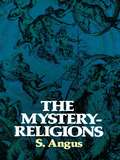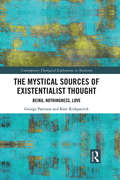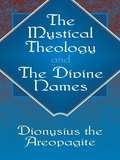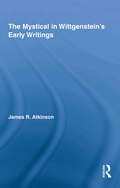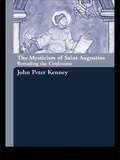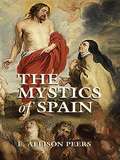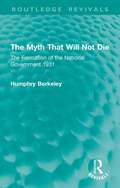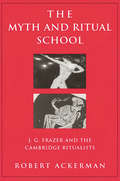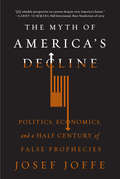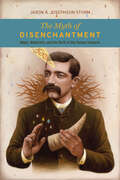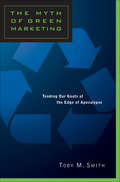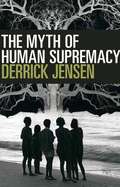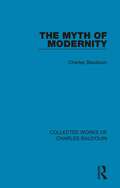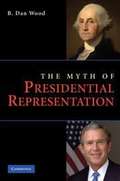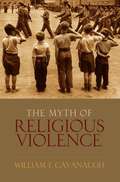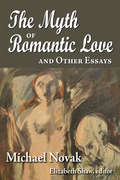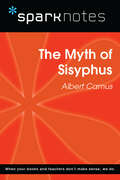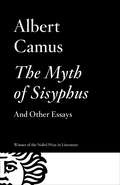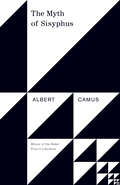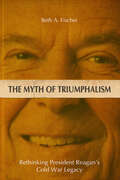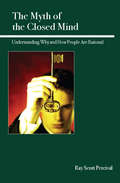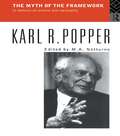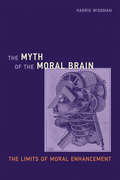- Table View
- List View
The Mystery of Things
by Prof A.C. GraylingFollowing the huge success of THE MEANING OF THINGS and THE REASON OF THINGS, a third collection of bestselling essays from Britain's top philosopher.'Human genius has done much, and promises much, in the way of removing the mystery from many things in our world; at the same time it recognises and honours the mystery in things too.'In this collection A.C. Grayling extends the range of his previous two books to show how much understanding people can gain about themselves and their world by reflecting on the lessons offered by science, the arts (including literature) and history. Covering subjects as diverse as Jane Austen's EMMA, the Rosetta Stone, Shakespeare, the Holocaust, quantum physics, Galileo, and even alien abductions, A..C. Grayling's latest collection is a rich source for reflection and contemplation over the mysteries of life.
The Mystery-Religions
by S. AngusWhat is the strange fascination of the Mystery-Religions for the ancient world and today, some 2,000 years later, for moderns? Why are these colorful ancient cults so little known, all information about them suppressed or distorted by centuries of official religion in Europe? What did these ancient beliefs have that exacted the respect of Socrates, Plato, Virgil, Apuleius, and other great men of the classical age? Was the religion that stamped them out, Christianity, itself originally a Mystery-Religion, with secret teachings that only initiates could comprehend and psychological techniques not generally revealed?This volume, generally considered the most useful single work in English on the subject, attempts to answer such questions, while at the same time offering a sound, solid background in the various forms of religious experience that are grouped together under the term Mystery-Religions. From the Eleusinian mysteries of ancient Greece through the Asiatic cults of Cybele, the Magna Mater, and Attis; the strange rompings of the Dionysian groups; Orphics with their impact on Greek philosophy; the Mysteries emergent from Egypt -- Hermes Trismegistos, the Pymander, Isis, and Osiris; on up to the religion that swept the Near East and Europe, carried by the Roman legions, and that almost became central for us today -- Mithraism.Each of these religions offered something to its devotees that the older ethnic and state religions could not: a sense of the value of the individual; heightened areas of experience, even to the manipulations of sensory experience; psychological insights that are only now being appreciated. Yet they all died out within a couple of centuries of the Christian era, Gnosticism (apart from a few vestigial groups in the Near East and Europe) subsuming their heritage last.
The Mystic Ark
by Conrad RudolphIn this book, Conrad Rudolph studies and reconstructs Hugh of St. Victor's forty-two-page written work, The Mystic Ark, which describes the medieval painting of the same name. In medieval written sources, works of art are not often referred to, let alone described in any detail. Almost completely ignored by art historians because of the immense difficulty of its text, Hugh of Saint Victor's Mystic Ark (c. 1125-1130) is among the most unusual sources we have for an understanding of medieval artistic culture. Depicting all time, all space, all matter, all human history, and all spiritual striving, this highly polemical painting deals with a series of cultural issues crucial in the education of society's elite during one of the great periods of intellectual change in Western history.
The Mystical Sources of Existentialist Thought: Being, Nothingness, Love (Contemporary Theological Explorations in Mysticism)
by George Pattison Kate KirkpatrickAt the time when existentialism was a dominant intellectual and cultural force, a number of commentators observed that some of the language of existential philosophy, not least its interpretation of human existence in terms of nothingness, evoked the language of so-called mystical writers. This book takes on this observation and explores the evidence for the influence of mysticism on the philosophy of existentialism. It begins by delving into definitions of mysticism and existentialism, and then traces the elements of mysticism present in German and French thought during the late nineteenth and early twentieth centuries. The book goes on to make original contributions to the study of figures including Kierkegaard, Buber, Heidegger, Beauvoir, Sartre, Marcel, Camus, Weil, Bataille, Berdyaev, and Tillich, linking their existentialist philosophy back to some of the key concerns of the mystical tradition. Providing a unique insight into how these two areas have overlapped and interacted, this study is vital reading for any academic with an interest in twentieth-century philosophy, theology and religious studies.
The Mystical Theology and The Divine Names
by Dionysius The Areopagite C. E. RoltThe treatises of Dionysius the Areopagite, written in Greek, were intended to combine Neoplatonic philosophy with Christian theology and mystical experience. This volume, which explores the nature and results of contemplative prayer, exercised a deep and enduring influence on the development of scholasticism-particularly in regard to the teachings of St. Thomas Aquinas.
The Mystical in Wittgenstein's Early Writings
by James R. AtkinsonThe aim of this book is to consider what reasonably follows from the hypothesis that the Tractatus Logico-Philosophicus can be interpreted from a mystical point of view. Atkinson intends to elucidate Wittgenstein’s thoughts on the mystical in his early writings as they pertain to a number of topics such as, God, the meaning of life, reality, the eternal and the solipsistic self.
The Mysticism of Saint Augustine: Re-Reading the Confessions
by John Peter KenneyAugustine's vision at Ostia is one of the most influential accounts of mystical experience in the Western tradition, and a subject of persistent interest to Christians, philosophers and historians. This book explores Augustine's account of his experience as set down in the Confessions and considers his mysticism in relation to his classical Platonist philosophy. John Peter Kenney argues that while the Christian contemplative mysticism created by Augustine is in many ways founded on Platonic thought, Platonism ultimately fails Augustine in that it cannot retain the truths that it anticipates. The Confessions offer a response to this impasse by generating two critical ideas in medieval and modern religious thought: firstly, the conception of contemplation as a purely epistemic event, in contrast to classical Platonism; secondly, the tenet that salvation is absolutely distinct from enlightenment.
The Mystics of Spain
by E. Allison PeersDuring the sixteenth century -- the golden age of Spanish mysticism -- Roman Catholicism produced a thoroughly orthodox form of mysticism, a type of meditation that lay at the core of religious beliefs and was practiced to raise spiritual consciousness. In this authoritative book, a leading specialist in the field presents a comprehensive, ground-breaking study of the works and personalities of fifteen mystical authors. A brief exploration of the period serves as a background to extracts from the authors' writings.Included are Juan de Ávila and his "Letter to a religious, urging him to the perfect love of God"; St. Teresa of Jesus and her "An exclamation of the soul to God"; and St. John of the Cross, represented in part by his best-known work, "Dark Night of the Soul." The text also contains "A contemplation to obtain love" by St. Ignatius of Loyola, as well as the meditations of Alonso de Orozco, Luis de Granada, Diego de Estella, Luis de León, and Pedro Malón de Chaide, among others. A list of books is provided for those who wish to make this anthology a starting point for further study.
The Myth That Will Not Die: The Formation of the National Government 1931 (Routledge Revivals)
by Humphry BerkeleyNo figure in the Labour movement has attracted such extremes of emotion as has James Ramsay MacDonald. Loved and almost worshipped for more than 30 years, his formation of the National Government in August 1931 incurred hatred, bitterness and contempt from those whom he had led for so long. MacDonald’s career and the admiration and odium which it engendered is without parallel in British politics. Originally published in 1978, this book provides an answer to the charge that MacDonald deliberately betrayed the Labour movement by forming a coalition government with the Conservative and Liberal Parties. It examines the criticism that he ruthlessly proceeded to destroy the Labour Party in the General Election of October 1931 – an election which he pledged, only two months earlier, would not be held. Using the private papers and authorised (auto)biographies, and the Cabinet minutes of the day, this book reconstructs what really happened between August 1 and 24 1931, and accounts for the mercilessness with which he is remembered by the Labour Party.
The Myth and Ritual School: J.G. Frazer and the Cambridge Ritualists (Theorists of Myth)
by Robert AckermanFirst Published in 2002. Routledge is an imprint of Taylor & Francis, an informa company.
The Myth of America's Decline: Politics, Economics, and a Half Century of False Prophecies
by Josef Joffe"A bracing and intelligent reminder that, for all its woes, America remains extraordinarily dynamic, innovative, and resilient."--Fareed Zakaria Hailed by the Wall Street Journal as one of the best books of 2013, The Myth of America's Decline is a highly provocative look at how the United States, for all its failings, continues to be the leading business, political, and intellectual model for all other nations. In a world where America bashers constantly chortle that the United States is in decline, Josef Joffe, using lively historical examples and empirical economic models, demonstrates that these doomsday contentions are flawed, and that America--even when compared with a resurgent China--is the land where the future is being born.
The Myth of Disenchantment: Magic, Modernity, and the Birth of the Human Sciences
by Jason A. Josephson-StormA great many theorists have argued that the defining feature of modernity is that people no longer believe in spirits, myths, or magic. Jason Ā. Josephson-Storm argues that as broad cultural history goes, this narrative is wrong, as attempts to suppress magic have failed more often than they have succeeded. Even the human sciences have been more enchanted than is commonly supposed. But that raises the question: How did a magical, spiritualist, mesmerized Europe ever convince itself that it was disenchanted? Josephson-Storm traces the history of the myth of disenchantment in the births of philosophy, anthropology, sociology, folklore, psychoanalysis, and religious studies. Ironically, the myth of mythless modernity formed at the very time that Britain, France, and Germany were in the midst of occult and spiritualist revivals. Indeed, Josephson-Storm argues, these disciplines’ founding figures were not only aware of, but profoundly enmeshed in, the occult milieu; and it was specifically in response to this burgeoning culture of spirits and magic that they produced notions of a disenchanted world. By providing a novel history of the human sciences and their connection to esotericism, The Myth of Disenchantment dispatches with most widely held accounts of modernity and its break from the premodern past.
The Myth of Green Marketing
by Toby SmithIn this groundbreaking study, Toby Smith analyses the role that social myths such as green marketing play in public understanding of the environmental crisis. This book introduces the concept of hegemony into environmental politics, using the concept to elucidate the political, economic, and social alliance that sustains our belief in industrial expansionism. The ecological crisis of the late twentieth century presents a challenge to the very foundations of this alliance. The hegemonic system reacts to a threat to its structure by producing social myths that provide a common sense understanding of the threat. Smith examines one such social myth, the contemporary phenomenon known as green marketing, and how it came to reinforce, rather than challenge, the ethics of productivism. By analysing green marketing as it relates primarily to the early 1990s corporate campaigns of companies such as McDonald's, Shell Chemicals, and Mobil Chemical Co., Smith demonstrates how these voices weave together an understanding of green consumerism using familiar language from economic and liberal democratic discourses. The Myth of Green Marketing is an original and important contribution to the field of environmental studies. As the first book on green marketing, it is sure to raise controversy with its unique discussion of the cultural and social aspects of environmental issues.
The Myth of Human Supremacy
by Derrick JensenIn this impassioned polemic, radical environmental philosopher Derrick Jensen debunks the belief in a hierarchy of nature and the superiority of humans. Vast and underappreciated complexities of nonhuman life are explored in detail; the paralysis of the scientific establishment on moral and ethical issues is confronted; and a radical new framework for assessing the intelligence and sentience of nonhuman life is put forth. A philosopher-poet of the environmental movement, Jensen sounds an urgent call for its liberation from human domination.
The Myth of Modernity (Collected Works of Charles Baudouin)
by Charles BaudouinFirst published in 1950, this is a late work by Charles Baudouin, world-famous French psychologist, and takes its title from the opening chapter which examines the transformation of the myth of Progress, characteristic of the eighteenth and nineteenth centuries, into the myth of Modernity, characteristic of the time of writing. The author has little sympathy for a development which he regards as essentially vulgar; the myth of Progress, he says, had its aspiration and gave man reasons for reaching out for better things, but the myth of Modernity ‘seems to give humanity reasons only for fleeing from itself, reasons for unhappiness, inasmuch as the man who runs away from himself is an unhappy man’. This chapter is characteristic of those that follow – on Baudelaire, Verlaine and other literary topics; on Art and the Epoch, The Prestige of Action, Technique versus Mysticism, Opinion and Tolerance, etc. A broad humanity and a gentle irony are the characteristic features of this stimulating book, now available again to be enjoyed in its historical context.
The Myth of Presidential Representation
by B. Dan WoodIn The Myth of Presidential Representation, B. Dan Wood evaluates the nature of American presidential representation, examining the strongly embedded belief - held by the country's founders, as well as current American political culture and social science theory - that presidents should represent the community at large. Citizens expect presidents to reflect prevailing public sentiment and compromise in the national interest. Social scientists express these same ideas through theoretical models depicting presidential behavior as driven by centrism and issue stances adhering to the median voter. Yet partisanship seems to be a dominant theme of modern American politics. Do American presidents adhere to a centrist model of representation as envisioned by the founders? Or, do presidents typically attempt to lead the public toward their own more partisan positions? If so, how successful are they? What are the consequences of centrist versus partisan presidential representation? The Myth of Presidential Representation addresses these questions both theoretically and empirically.
The Myth of Religious Violence
by William T. CavanaughThe book challenges the conventional wisdom that religion has a dangerous tendency to promote violence and examines thoroughly how the twin categories of religion and the secular are constructed.
The Myth of Romantic Love and Other Essays
by Michael NovakWritten by noted Catholic philosopher Michael Novak, the selections in The Myth of Romantic Love and Other Essays highlight the arc of his intellectual career. Collectively demonstrating the fundamental unity of Novak's work, the sixteen essays in this book span a broad range of political, economic, and social topics.The selections offer clarity of thinking for the sake of concrete ends. For example, The Myth of Romantic Love, the chapter from which the title of this work is drawn, sharply distinguishes the love that popular culture portrays from the true Christian vision of love. And The Family out of Favor argues, if things go well with the family, life is worth living; when the family falters, life falls apart. Thus, true Christian love manifest in marriage and family life is a greater resource for civilized society than any other institution.Although this collection shows that Novak's viewpoints did evolve over time, he remains a thinker that is clearly rooted in the ancient and medieval Catholic tradition. From his discussions of gender relations, to economics, culture, and politics, his perspective honors the primacy of man and his immediate experience, and thereby ultimately glorifies the Creator. Novak's writing will infuriate some readers, and inspire many others—but both comrades-in-arms and intellectual opponents will find the clarity and intensity of his writings undeniable.
The Myth of Sisyphus (SparkNotes Philosophy Guide)
by SparkNotesThe Myth of Sisyphus (SparkNotes Philosophy Guide) Making the reading experience fun! SparkNotes Philosophy Guides are one-stop guides to the great works of philosophy–masterpieces that stand at the foundations of Western thought. Inside each Philosophy Guide you&’ll find insightful overviews of great philosophical works of the Western world.
The Myth of Sisyphus (Vintage International)
by Albert CamusOne of the most influential works of this century, The Myth of Sisyphus and Other Essays is a crucial exposition of existentialist thought. Influenced by works such as Don Juan and the novels of Kafka, these essays begin with a meditation on suicide; the question of living or not living in a universe devoid of order or meaning. With lyric eloquence, Albert Camus brilliantly posits a way out of despair, reaffirming the value of personal existence, and the possibility of life lived with dignity and authenticity.
The Myth of Sisyphus: The Myth Of Sisyphus, The Outsider, The Plague, The Rebel (Vintage International)
by Albert CamusOne of the most influential works of this century, The Myth of Sisyphus and Other Essays is a crucial exposition of existentialist thought. Influenced by works such as Don Juan and the novels of Kafka, these essays begin with a meditation on suicide; the question of living or not living in a universe devoid of order or meaning. With lyric eloquence, Albert Camus brilliantly posits a way out of despair, reaffirming the value of personal existence, and the possibility of life lived with dignity and authenticity.
The Myth of Triumphalism: Rethinking President Reagan's Cold War Legacy (Studies In Conflict, Diplomacy, And Peace Ser.)
by Beth A. FischerThis historical study dismantles the myth of Reagan’s hardline victory and sheds light on his true diplomatic success in cooperation with Gorbachev.Did President Reagan’s hawkish policies destroy the Soviet Union and enable the United States to win the Cold War? Many Americans believe this to be the case. In this view?known as “triumphalism”?Reagan’s denunciations of the “evil empire” and his military buildup compelled Moscow to admit defeat. The president’s triumph demonstrates that America’s leaders should stand strong and threaten adversaries into submission.Drawing on both US and Soviet sources, this study demonstrates that triumphalism is based on a series of falsehoods about President Reagan’s intentions, his policies, and the impact his administration had on the Soviet Union. In reality, the president’s initially hardline posture undermined US interests and brought the superpowers to the brink of war. Success only came when Reagan changed his approach to one of cooperation.Together, President Reagan and General Secretary Gorbachev were able to accomplish what no one at the time thought possible?the peaceful conclusion of the Cold War. The president’s opposition to nuclear weapons, his determined leadership, and his dedication to diplomacy are his most enduring legacies.
The Myth of the Closed Mind: Understanding Why and How People Are Rational
by Ray Scott Percival"It's like talking to a brick wall" and "We'll have to agree to disagree" are popular sayings referring to the frustrating experience of discussing issues with people who seem to be beyond the reach of argument. <P><P>It's often claimed that some people-fundamentalists or fanatics-are indeed sealed off from rational criticism. And every month new pop psychology books appear, describing the dumb ways ordinary people make decisions, as revealed by psychological experiments. The conclusion is that all or most people are fundamentally irrational. Ray Scott Percival sets out to demolish the whole notion of the closed mind and of human irrationality. There is a difference between making mistakes and being irrational. Though humans are prone to mistakes, they remain rational. In fact, making mistakes is a sign of rationality: a totally non-rational entity could not make a mistake. Rationality does not mean absence of error; it means the possibility of correcting error in the light of criticism. In this sense, all human beliefs are rational: they are all vulnerable to being abandoned when shown to be faulty. Percival agrees that people cling stubbornly to their beliefs, but he maintains that not being too ready to abandon one's beliefs is rational.
The Myth of the Framework: In Defence of Science and Rationality
by Karl PopperIn a career spanning sixty years, Sir Karl Popper has made some of the most important contributions to the twentieth century discussion of science and rationality. The Myth of the Framework is a new collection of some of Popper's most important material on this subject.Sir Karl discusses such issues as the aims of science, the role that it plays in our civilization, the moral responsibility of the scientist, the structure of history, and the perennial choice between reason and revolution. In doing so, he attacks intellectual fashions (like positivism) that exagerrate what science and rationality have done, as well as intellectual fashions (like relativism) that denigrate what science and rationality can do. Scientific knowledge, according to Popper, is one of the most rational and creative of human achievements, but it is also inherently fallible and subject to revision.In place of intellectual fashions, Popper offers his own critical rationalism - a view that he regards both as a theory of knowlege and as an attitude towards human life, human morals and democracy.Published in cooperation with the Central European University.
The Myth of the Moral Brain: The Limits of Moral Enhancement (Basic Bioethics)
by Harris WisemanAn argument that moral functioning is immeasurably complex, mediated by biology but not determined by it.Throughout history, humanity has been seen as being in need of improvement, most pressingly in need of moral improvement. Today, in what has been called the beginnings of “the golden age of neuroscience,” laboratory findings claim to offer insights into how the brain “does” morality, even suggesting that it is possible to make people more moral by manipulating their biology. Can “moral bioenhancement”—using technological or pharmaceutical means to boost the morally desirable and remove the morally problematic—bring about a morally improved humanity? In The Myth of the Moral Brain, Harris Wiseman argues that moral functioning is immeasurably complex, mediated by biology but not determined by it. Morality cannot be engineered; there is no such thing as a “moral brain.”Wiseman takes a distinctively interdisciplinary approach, drawing on insights from philosophy, biology, theology, and clinical psychology. He considers philosophical rationales for moral enhancement, and the practical realities they come up against; recent empirical work, including studies of the cognitive and behavioral effects of oxytocin, serotonin, and dopamine; and traditional moral education, in particular the influence of religious thought, belief, and practice. Arguing that morality involves many interacting elements, Wiseman proposes an integrated bio-psycho-social approach to the consideration of moral enhancement. Such an approach would show that, by virtue of their sheer numbers, social and environmental factors are more important in shaping moral functioning than the neurobiological factors with which they are interwoven.
